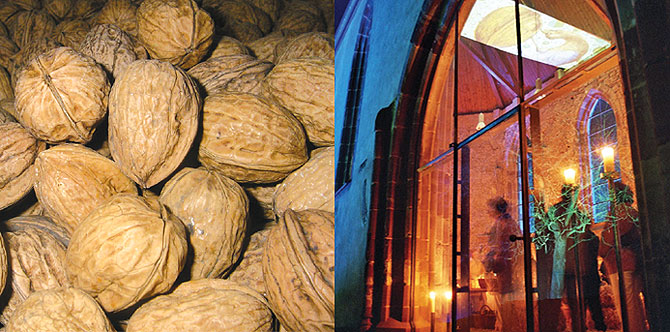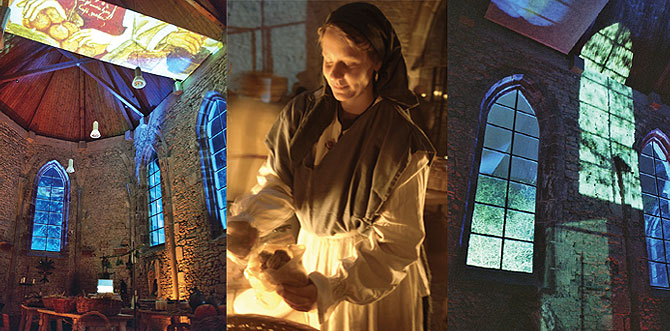8
winter – hibernus
market.light

Market
The historical sources of the late Middle Ages document that products such as apples, pears, walnuts were grown and processed in the former Wintringen Priory. In addition, there was bread, cheese, wine and water. These products were used to supply the priory, the mother monastery - the Premonstratensian Abbey of Wadgassen - and certainly the people in the surrounding area at markets. Some of these products are today again or still ecologically grown or offered on the Wintringer farm. These include fruit and walnuts as well as sausage, cheese and cereals.
People with disabilities are integrated into the operational processes at Wintringer farm. Thus, today the social mission and the protection of nature and the environment are meaningfully combined through ecological cultivation of high-quality regional food. Agriculture and social mission are preserved at this extraordinary place and, together with the cultural heritage of the Middle Ages that can still be experienced here, create awareness of ecological agriculture, social responsibility, cultural history and regional identity.

For the winter event on November 20, 2005, those products that are still produced and sold on the farm today, were "offered for sale" in the "chapel" in the tradition handed down. A medial ceiling projection mirrored as a counter world, medieval market scenes. The resulting mirror images interwove with the representations in the twilight of the dusk...

Light
Before the invention of electricity, light was not a universally and always available convenience. Candles were so expensive that they served as precious consecrations and were carefully guarded. The dark forest, the nights were unsettling; daytime and seasons rhythmized the lives and pursuits of people much more than today. In the theology, religious art and church architecture of the Middle Ages, the precious light plays an important role as a sign of the divine.
What a sensation electric light meant many hundred years later can only be imagined. Today, we have almost unlimited possibilities for creating light and using it to set the stage. Today, light no longer serves exclusively to provide brightness, but is also a medium of design.

Ingo Bracke's light installation contrasted the modern light staging with the archaic power of the candlelight inside. He enveloped the exterior of the chapel in a cool, blue-green shadowiness that contrasted clearly with the warm light of the interior. The light here served to stage and "transfigure" the medieval building in the twilight of the winter evening. Through the unreality of the light, the distant past of the "chapel" was heightened into the magical-mystical.

Music
Winter songs and texts by the ensemble Wahnfrîd, already known from the fall event in 2004, accompanied the event.
